Female Tattoo Artists of Paraguay
Tattooing for fashion, for love or revenge. For a promise. Drunk tattoos. Tattooing for pain, for pleasure. Incapable of stopping tattooing. Tattoos that are thousands of years old. Tattoing because you can’t or because you should’t. Getting tattoos because everyone does. By magic and by disappointment. Getting tattoo’d with a monk in Cambodia or with a woman in Paraguay.
( Castellano aquí )
Female tattoo artists in Paraguay make their way in a society where the idea of gender equality is in regression. Discriminatory stereotypes in the media and acts of intimidation and harassment against women are frequent. The gender wage gap is abrupt. Paraguay is the worst country in South America to be a woman.
Reggaeton, jazz, national rock, metal and film music. DJ, wise advisor, ilustrator, child prodigy and former catechist. They couldn’t be any different from each other, and yet they form a link between the art of tattooing and the determination of demolishing prejudices. These formidable Paraguayan tattoo artists work every day to modify much more than our bodies. They leave indelible marks for the generations to come.
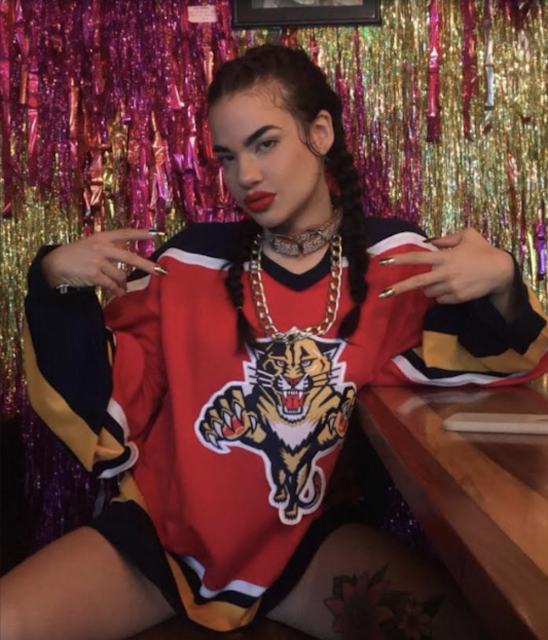
Mi$$il
I met her at the gnocchi of the resistance, at a house in Asuncion where some live and others would like to live, a refuge and stronghold that mixes activism and queer ideas. It’s called La Mansion 108, and it’s where Mi$$il also lives. She defines herself as a Latin Artist. She is a tattooist, DJ, composer, and singer with international recognition and has just released the video of Ronroneo, a reggaeton song that sounds with a bang. The first thing that this superstar does when we meet is suggest the names of other female tattoo artists I should contact. Sorority to the max.
She was born and raised in Ciudad del Este. In high school she was dancing Brazilian funky music, and recognizes the influence that the tropical colors of the Triple Frontera had on her art. After spending some time in Asuncion where she affirmed herself as a DJ and artist, she traveled to Brazil in search of inspiration and destiny. It was there she learned to tattoo. “You have to go and come back” she emphasizes. “In your personal search one needs to find new art, but I want to travel and come back.” Life would be more comfortable somewhere else, but like other Paraguayan artists, intellectuals and activists, she has a strong commitment to the current reality of her country and the battle she is a part of. “We all know our fight” from a post on her Instagram account on 8M.
Men and women of Asuncion and other cities of Paraguay tattoo themselves with her. The majority are women and gay men. There are heterosexual men as well, but it’s less common. Without resentment but with laughter, she reminisces on men joking about her when she began DJ’ing. Her arrival to the world of tattoos deepened the impact. “Maybe I intimidate them,” she suggests, while covering with plastic wrap the tattoo I just got from her. She looks up through her glasses with barely credible innocence and reminds me how to care for the tattoo for the next few days. She on the other hand, in the next few days, will be on stage playing her music alongside Gorillaz, and following that with Sara Hebe. “I’m super excited, I love them both. It is important to listen in order to understand.”
To aspiring tattooists it’s always recommended starting as soon as possible. “You have to nurture the passion from a young age.” Her own mother encourages her not to get distracted from tattoos when she sees her so devoted to music. “Life in a community awakens you”, referring to her life in La Mansion 108. There she found her own way of expressing feminism. In the music video for “Todo lo Mejor” she sings “I am a girl who likes to shine” barely covered in small multicolored tattoos. In the same song she promises “come with me, I can enlighten you”. She learns and reflects on everything, with her own colors, like a diamond.
Instagram Missil Flashtattoo
Instagram Missil Artista Latina
Ph Ian Schuster
Make up David Friedmann
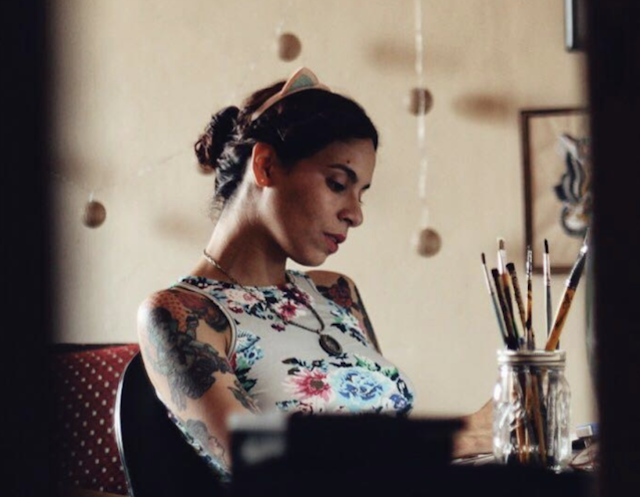
Drúgula
I met Dru at a party at the Guarida de las Incxgibles, a space of “economic instability – emotional instability – pickets, marches, upheaval – hopeful pessimism” among other irresistible promises. A few days later I visit her in her studio, where she was doing her first tattoo for a girl who was joined by a friend. I felt like listening to the conversation that came about: one of them had just returned from Germany and they were evaluating the advantages of life abroad while being confronted by Paraguayan life, which they never wanted to leave. What is the most Paraguayan thing someone can tattoo? “The guampa!” which is what they call the cup used for drinking terere in Paraguay. “And the piri hat”, the traditional hat made from the palm tree karanda’y. A *piri *hat recently marked the highest altitude reached by an object launched into space from Paraguay, surpassing only that of the chipa astronaut – delirious delights of this land. “But the piri hat is already used by skateboarders too,” says Dru. The urban tribes won’t renounce their Paraguayan identity either.
Her first tattoo she did on herself, at 14, hand poked, with ink and a sewing needle. At 18 she bought her first tattoo gun. She spent a couple of years studying engineering at the university and alternated between metal concerts and tattoo events. Little by little she earned her right in the Asuncion underground to become a dedicated apprentice tattoo artist. “Many of my clients are women who get tattoos for the first time, I learned to respect the expression of each one, it doesn’t matter if they come to get a tattoo they don’t know why they’re getting, there is something inside them that can acquire meaning later”. She talks about the archetypes of designs and the greater possibilities offered by technology. “I have to go back to drawing comics” she reminds herself. Her classic fondness for metal does not detract from the jazz that accompanies her work. We talked about the party the night before, where Sonido Chuli played, the celebrated local cumbia band, and Terror Manija, a young all-women punk band from the province of Misiones, Argentina. Blessed Paraguayan syncretism. “There is beauty” she points out, with mystery and wisdom.
The act of tattooing in Dru is linked to a discourse that interweaves the artistic, the mystical and the ancestral. In her daily work there is something that transcends it and has to do with a vital purpose. “Throw yourself our there, escape from yourself and your character, dare to be crazy.” Today her family respects and values her art. She reflects on that conquest and smiles: “I always believed in myself.” She wants to become the kind of adult who inspired her as a child. She encourages teens to “never stop drawing” and promises that “an adult can be interesting. Empower yourself, sister!” Dru is the living confirmation of her preaching.
Instagram Drugula Tattoo
Ph Afrodita
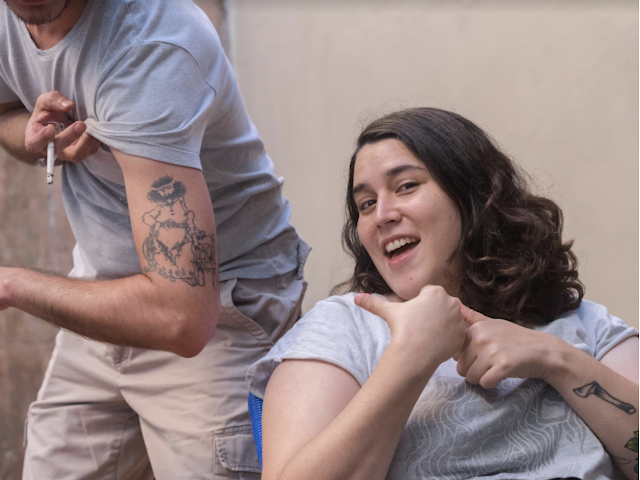
Leda
I met her at the Milky Chance concert in Asunción. The first thing she did was tell me that it was her 5 month anniversary married to Karen Ovando, the famous Paraguayan radio host and a reference to national rock. They traveled to Argentina to get married because Paraguay still struggles to achieve that right. We got lost in the musical atmosphere of the concert and met back up a few days later in El Kurtural, an independent journalistic outlet that promises “phenomenal stories from the most unfair region of the world” where she works as an illustrator.
Leda is the mother of CoquitoMan, the Paraguayan superhero who fights against the villains while drinking terere. Leda and Karen are part of the Paraguayan superheroes who fight against the heteropatriarchy all while going to concerts, tattooing, designing, taking part in activism, and facing the media uproar following their marriage in Argentina. And, of course, they also drink terere.
She spent years designing the first tattoo that she did: “I am very picky about design”. While we are chatting, the folk rock of La Secreta plays. Paraguayan rock and LGBT activism are tattooed on her soul. She recounts a love story, tells of local bands and tattoos: while Karen from her radio program made room for national bands like Salamandra or Flou, Leda had tattooed all the members of her cousin’s music band. Karen set up a homemade tattoo machine with a radio engine and an old pen but her first professional machine was given to her by Martin, the drummer of Carnival Prozac Dreams, and a tattoo artist at the tattoo parlor Electric Circus. Solidarity is a constant within this tribe.
She has concrete and sensitive answers. She never stops marveling at the fact she can “draw on someone’s skin and have it turn out well”. The majority of her clients are women. For her, there’s no place for the complaints against the hostile environment she happens to be a part of. She laughs with modesty and satisfaction when she remembers the triple challenge of being a woman, lesbian and tattooer in Paraguay, but refuses to accept recognition. She prefers to highlight the emotion of having met other women with whom she shares this passion and reiterates her recognition for those who started before her. To the new generations of tattoo artists she advises them to be “cheeky” but also “to start drawing a lot”. And practice “hand poke” with fruit. Shortly after saying goodbye she sends me a message that says “the account of the future” and a link to her Indieteka. These women sow design, art and hope in the middle of the desert. I cannot stop listening to them.
Instagram Leda Sostoa Tattoos
Instagram Leda Sostoa
Ph Nadia Gómez
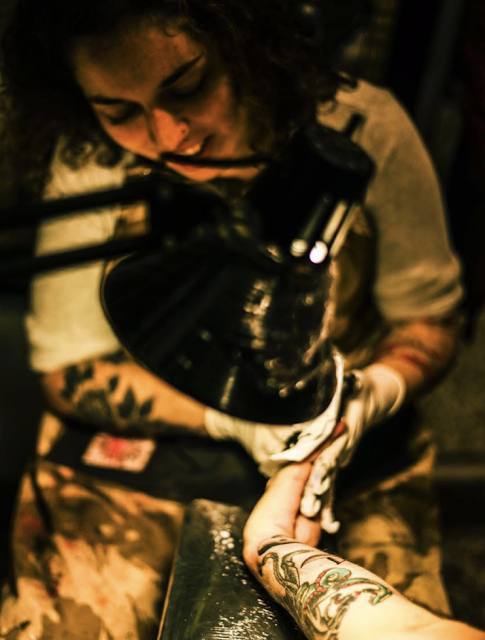
Marcia
We meet on Saturday of Holy Week in her studio in Asunción. She’s 21 years old. They call her “the child prodigy” and, according to an urban myth, she began to tattoo at 13. In the deadly silence of the holiday, Marcia burst into laughter when I ask her about her nickname and she swears she’s never heard it before. She is the daughter of the famous tattoo artist from Asunción, Walter, pioneer of ink in Paraguay, and therefore the first second-generation tattoo artists in the country.
She was the only girl in school with a tattooed dad. “What’s ‘normal’ is what I find harder to understand.” The lineage brings its benefits but also its responsibilities: when finishing high school she considered continuing with her studies, but her dad warned her that if she wanted to become a tattoo artist she would have to dedicate herself fully. Up against the wall, she chose to tattoo. The first year she spent drawing and painting with watercolor. Then she had to weld a hundred needles. She tells me and her eyes sparkle.
While we talk, she calibrates the tenor of our chat by changing the playlist to find the exact tone. Like other young people, she complains that the Paraguayan music scene “is lacking“. I tell her that the young people of Amsterdam complain that in their city there are no good parties and we laugh together. She listens to “good music”: classic rock and doom metal. She refers to Black Sabbath and Radiohead, and exclaims that the Eeeks are “the best band” and that Luisonz are “powerful”.
Her first tattoo was done by her dad when she was 16. To break the myth, she avows that she was actually 19 when she started to tattoo. Her style is old school and she loves to draw girls. “Not obscene girls. No one can draw the body of a woman like a woman can. The beautiful body of a woman.” She has plans to travel to Buenos Aires and San Pablo, to tattoo in some studios and to visit others, but she doesn’t imagine living anywhere but Asuncion. She explains that the tattoo artists who come to Tattoo Down Babylon, the classic event organized by her dad, fall in love because “Paraguay has something”. “They travel all over the world, but they fall in love with this place.” Her favorite thing to do is go out with friends, “buy beers and walk through downtown,“ Asunción. “This land is magical.”
She didn’t escape slander: the gossip was that she only tattooed women. She laughs. “The majority of my clients are men.” Anyways, “I get along better with men as far as music goes”. “I love being a woman. A tattoo artist and a woman.” And as such, her first method of fighting back was to say “we can tattoo”. It is easier for her to relate to her older friends, who are mostly feminists. This year she went with them to her first 8M demonstration. “I cried, it was incredible.” Some advice to the younger crowd: “tattoo yourself well” and “if you have no desire, don’t tattoo, maybe other people won’t notice but you won’t feel good about it“. The millenary ethic of this job is starting to grow fast here. Maybe this land is really magical.
Instagram Marcia de Souza Lobo Brizuela
Ph Maurizio Corso
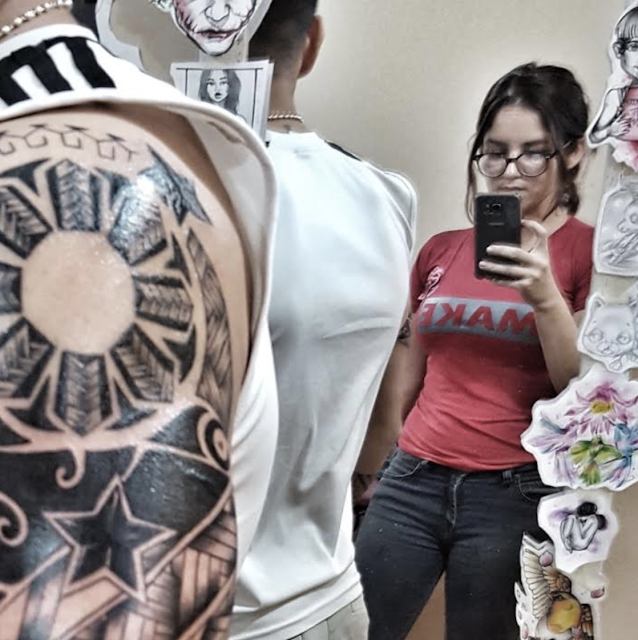
María del Mar
She invites me to her studio in San Lorenzo, a neighboring city to Asunción. On the way I find myself in chaotic traffic and the roughness of the industrial zone, with some patches of grass where kids play soccer. Interspersed between workshops and markets, I spot a couple of tattoo and piercing parlors every now and then.
She offers me water and says she used to live in one of those neighborhoods “where cobblestone predominate, and time is slower” but that “she missed the noise of cars”. From the computer comes the slow voice of a documentary reporter. In her studio there are no dragons, katanas or heavy metal. Before becoming a tattooist, María del Mar was a catechist. After a disagreement about how to help children relate to their identity, she decided to leave the religious vocation. The responsibility for those who care for children is “to give them emotional tools”. She is the mother of a little girl whom she educates according to her values, despite living in a country that forbids the teaching of gender theory in public institutions. She wins her victories with gentle persuasion.
The first person she tattooed was her boyfriend. She admits that, in her apprenticeship, men tattoo artists never gave her problems compared to the harassment that Paraguayan women suffer in their office jobs. “I avoid free tattoos to avoid uncalled for comments. With your boss in the office it can be more complicated.” A slow and tenacious path as a tattoo artist led her to become independent of jobs and belief systems that did not resonate with her. And it underlines the unconditional loyalty that Paraguayan women have.
María del Mar has something of modest heroism that reflects a national quality. The tattoos she has are not in sight. She draws and tattoos the most beautiful indigenous women and Paraguayan flowers. One of her flower tattoos is inscribed che symi porâ, “my pretty little mother”. Another of her designs is a kind of indigenous goddess Kali, with six arms and lustrous black hair, which lavishes magic, healing, fortune, and fertility. Just as peony brought to the traditional Japanese tattoo its beauty and symbolism, the women and mburucuja flowers of Maria del Mar bring the beauty and courage of their land to the emerging Paraguayan tattoo tradition.
Instagram Made ink Py
Ph María del Mar
